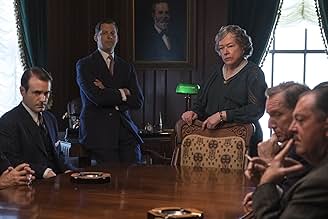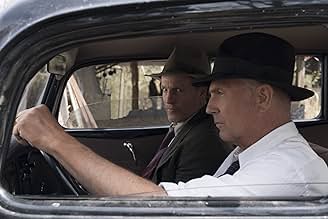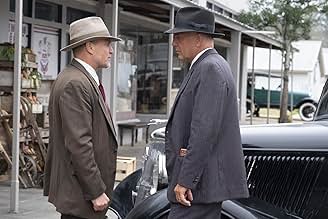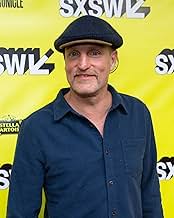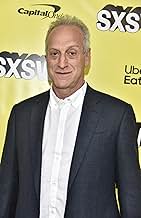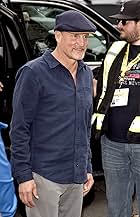Deux Texas Rangers sortent de leur retraite pour retrouver les célèbres hors-la-loi Bonnie et Clyde.Deux Texas Rangers sortent de leur retraite pour retrouver les célèbres hors-la-loi Bonnie et Clyde.Deux Texas Rangers sortent de leur retraite pour retrouver les célèbres hors-la-loi Bonnie et Clyde.
- Réalisation
- Scénario
- Casting principal
- Récompenses
- 3 nominations au total
Josh Caras
- Wade McNabb
- (as Joshua Caras)
Avis à la une
Haven't seen alot of Netflix movies but this is the best Netflix movie I have seen.
The acting of Woody Harreloson and Kevin Costner was superb.
The pace of the movie is quite slow and there were times were the movie was kinda boring.
I love the bathroom scene and the scene when they are playing cards and gives us a backstory of Gault and Hamer.
The acting of Woody Harreloson and Kevin Costner was superb.
The pace of the movie is quite slow and there were times were the movie was kinda boring.
I love the bathroom scene and the scene when they are playing cards and gives us a backstory of Gault and Hamer.
Movie that takes place in the 30s it was truly well done and very well thought out. This movie created the mystery of bonnie and clyde and the drama and havoc the created throughout the south. The true story of these 2 retired rangers made this all the more appealing. Kevin costner was a magnificent choice for haymer! Harrelson was perfect as his partner. I really enjoyed the big names in this movie down to Kathy bates. Very happy with the detail this film portrayed.
This is an extremely well put together, engaging and entertaining telling of the pursuit of Bonnie and Clyde. Woody Harrelson is at the top of his form. He's played the part of the hardbitten lawman before, but it keeps getting better. And Costner does almost as well. The interplay is absorbing and extremely well written and acted.
In western culture we love our bandit myths and legends, which for some reasons celebrate some fairly nasty characters. Knowing the real story of Bonnie and Clyde, as opposed to the myth created by the contemporary news media and J. Edgar Hoover, always made Arthur Penns near worshipful portrayal of these two blood drenched spree murderers jarring. Bonnie and Clyde were bloodthirsty sociopaths, who in fact ambushed and murdered a fair number of people, including shooting unarmed store clerks in the back. Bonnie and Clyde were not "sticking it to the man" robbing big business like banks as much as they were in fact robbing and killing owners of small stores and then committing cold blooded murder of policemen trying to stop the mass murder spree.
The ultimate "ambush" of Bonnie and Clyde was not some planned execution, it was the result of the simple fact that those two had, withing seconds of being stopped, routinely murdered police who stopped them. They also did most of their murders with simple revolvers and sawed off shotguns, and almost none of the guns used were machine guns (a documented invention of Hoover's FBI; of the twenty or so people Bonnie and Clyde shot exactly one was shot with a machine gun). Hoover was fixated on above all else a) trying to prove that his agency's high tech of the time was the best avenue, despite all evidence to the contrary, b) distracting from, even to the point of denying the existence of, organized crime that Prohibition he supported had created. Hence his spinning of "celebrity" criminals like Dillinger and Bonnie and Clyde, which also fit his narrative that we needed a national police force.
In fact FBI in fact made a mess out of their pursuit of Bonnie and Clyde, and it was old fashioned policing by two standard state lawmen that put an end to their violent spree.
So watch this film to see great buddy cop tension, and character interplay. Seriously as good as True Detective level. And a subtle subtext of well done but not over the top critique of Penn's worshipful portrayal of these two hyperviolent criminals in his 1967 film. The bumbling lawmen myth attached to to the 1967 film is also blown away. Bonnie and Clyde's murder and crime spree ranged over an area of 600,000 square miles, and it was old fashioned hard-bitten police work that got them.
Lastly the period work is another very well done element. Not just the visual elements, but the the dialogue. Instead of the fictitious Hepburn-Tracy like, now laughable, staccato dialogue of the 1967 film, we get a much more accurate laconic way of speaking at that time. More is said in fewer words between Harrelson and Costner.
Give it a watch, you will not be disappointed, although your prior positive views of the one-dimensional 67 film, may change.
In western culture we love our bandit myths and legends, which for some reasons celebrate some fairly nasty characters. Knowing the real story of Bonnie and Clyde, as opposed to the myth created by the contemporary news media and J. Edgar Hoover, always made Arthur Penns near worshipful portrayal of these two blood drenched spree murderers jarring. Bonnie and Clyde were bloodthirsty sociopaths, who in fact ambushed and murdered a fair number of people, including shooting unarmed store clerks in the back. Bonnie and Clyde were not "sticking it to the man" robbing big business like banks as much as they were in fact robbing and killing owners of small stores and then committing cold blooded murder of policemen trying to stop the mass murder spree.
The ultimate "ambush" of Bonnie and Clyde was not some planned execution, it was the result of the simple fact that those two had, withing seconds of being stopped, routinely murdered police who stopped them. They also did most of their murders with simple revolvers and sawed off shotguns, and almost none of the guns used were machine guns (a documented invention of Hoover's FBI; of the twenty or so people Bonnie and Clyde shot exactly one was shot with a machine gun). Hoover was fixated on above all else a) trying to prove that his agency's high tech of the time was the best avenue, despite all evidence to the contrary, b) distracting from, even to the point of denying the existence of, organized crime that Prohibition he supported had created. Hence his spinning of "celebrity" criminals like Dillinger and Bonnie and Clyde, which also fit his narrative that we needed a national police force.
In fact FBI in fact made a mess out of their pursuit of Bonnie and Clyde, and it was old fashioned policing by two standard state lawmen that put an end to their violent spree.
So watch this film to see great buddy cop tension, and character interplay. Seriously as good as True Detective level. And a subtle subtext of well done but not over the top critique of Penn's worshipful portrayal of these two hyperviolent criminals in his 1967 film. The bumbling lawmen myth attached to to the 1967 film is also blown away. Bonnie and Clyde's murder and crime spree ranged over an area of 600,000 square miles, and it was old fashioned hard-bitten police work that got them.
Lastly the period work is another very well done element. Not just the visual elements, but the the dialogue. Instead of the fictitious Hepburn-Tracy like, now laughable, staccato dialogue of the 1967 film, we get a much more accurate laconic way of speaking at that time. More is said in fewer words between Harrelson and Costner.
Give it a watch, you will not be disappointed, although your prior positive views of the one-dimensional 67 film, may change.
It's 1934. Bonnie Parker helps Clyde Barrow escape a Texas prison work gang. Governor Miriam "Ma" Ferguson (Kathy Bates) faces public pressure. Frank Hamer (Kevin Costner) is recruited to be a highwayman with orders to take down the rampaging fugitives. He and his partner Maney Gault (Woody Harrelson) are former Texas Rangers which was disbanded in those more civilized times. The duo tracks the fugitives to their ultimate ambush deaths in Louisiana.
Netflix seems to be taking over these medium sized films. This one tackles Bonnie & Clyde but from the other side. It's fascinating that Bonnie & Clyde were and continue to be media sensations. There are countless versions of them on the small screen and the big screen. They are cultural icons. They're basically shorthand for criminal Romeo & Juliet. They are cool and hot. They are the excitement and the romantic. Almost nothing is given to those who hunted and killed them. So it's really fascinating to see these icons with the eyes of their pursuers. Whether it's Costner, the time period, or the criminal icons, this reminds me of a harsher and less glossy The Untouchables. Bonnie & Clyde are more like side characters. They are the shark in Jaws. This paints a heroic weary picture of Hamer and Gault. These are old gunslingers from the Ole West. The truth is a little muddier. The ambush is interesting which does something more than the usual. The production is pretty good although I was concerned about authenticity at the beginning. It is closer than most Hollywood production. These are great characters. Costner and Harrelson are well within their elements. This is an engaging movie as a companion piece to the countless Bonnie & Clyde movies.
Netflix seems to be taking over these medium sized films. This one tackles Bonnie & Clyde but from the other side. It's fascinating that Bonnie & Clyde were and continue to be media sensations. There are countless versions of them on the small screen and the big screen. They are cultural icons. They're basically shorthand for criminal Romeo & Juliet. They are cool and hot. They are the excitement and the romantic. Almost nothing is given to those who hunted and killed them. So it's really fascinating to see these icons with the eyes of their pursuers. Whether it's Costner, the time period, or the criminal icons, this reminds me of a harsher and less glossy The Untouchables. Bonnie & Clyde are more like side characters. They are the shark in Jaws. This paints a heroic weary picture of Hamer and Gault. These are old gunslingers from the Ole West. The truth is a little muddier. The ambush is interesting which does something more than the usual. The production is pretty good although I was concerned about authenticity at the beginning. It is closer than most Hollywood production. These are great characters. Costner and Harrelson are well within their elements. This is an engaging movie as a companion piece to the countless Bonnie & Clyde movies.
Distributed by Netflix this 2019 Casey Silver produced film is a period crime drama set in the 1930's which tells the story of two former Texas Rangers who are hired to track down the notorious criminals Bonnie & Clyde. Stuck in development hell for nearly 15 years, what was originally going to be a Universal Pictures film nearly did not get made until Netflix bought the project in 2018.
Its 1934 and America is in 'the great depression'. Bonnie & Clyde have been on the run for two years, in which time they have broke some of their gang out of prison, and they have continued a spree of violence. Begrudgingly, former Texas Ranger Frank Hamer (Kevin Costner) is brought out of retirement to help authorities, and he seduces his former colleague Benjamin Maney Gault (Woody Harrelson) to the cause too. Using all the old tricks from their past, and learning some new tricks along the way, the senior rangers hunt for Bonnie Parker (Emily Brobst) and Clyde Barrow (Edward Bossert) to bring them to justice, or to give America freedom from their heinous crimes.
Having seen different variations of the Bonnie and Clyde story, including the 1967 "Bonnie and Clyde" film, I expected this film to feature the notorious criminals more than it did. I was surprised but delighted that instead of just focusing on them, this film followed two of the lawmen that were trying to track them down. It was refreshing to see the story from the other side rather than glorifying the criminals like previous films and TV series have.
Costner and Harrelson perform well as the former Texas Rangers. With the star power that the pair have it would be easy not to believe in their characters, but they feel authentic in the roles and deliver them with credibility.
The cinematography on display is superb. The construction of the landscape and scenery is done well and looks gorgeous. At times, the sweat and the dirt in the scenes seems to ooze out of the screen and into the pores of the audience. There are apparently some historical inaccuracies compared to what has been written about the events being shown, but not enough for it to become a work of fiction. It treads the path of fact carefully, to the point that the director tried to work close to the actual Bonnie & Clyde trail as he could -filming in the same locations (or as close as possible) to where real crimes occurred.
The pace of the film has been criticized in some of the reviews I have read. While it was not the quickest film, I did not personally have a problem with it. I think the film needed to be a slow burner to build up the story and the chase. The law seems to be two steps behind all the time, and there is a noticeable shift in the last act of the film where the law has for once got ahead of the criminals. To me, the pace of the film was reminiscent of some of the crime biopics of the 1980's and 1990's. It felt like the same kind of pacing as other films I have seen Costner in, like "The Untouchables" (1987), like "JFK" (1991). Perhaps the audience that did not enjoy the pace would have preferred something with more action in, and therefore a film from the lawman's side of the chase might not be the best choice.
I enjoyed the film. I thought it was beautifully crafted and brought to life well by those in front of and behind the camera. It was entertaining to watch, and having seen previous versions of Bonnie & Clyde, I learned something new here, instead of just been romanticized by their folklore exploits of robbing the rich and giving to the poor. Some films are all-ages and can be watched by everyone, I would put this film in the grown-up film category and suggest it needs maturity and patience to enjoy it. It's a film that feels old fashioned, not just because to the 1930's period it depicts, but also in the way that this 2019 film unfolds. Real acting, simple story, basic plot with no rush and no CGI to get the audience to the end. Refreshing.
Its 1934 and America is in 'the great depression'. Bonnie & Clyde have been on the run for two years, in which time they have broke some of their gang out of prison, and they have continued a spree of violence. Begrudgingly, former Texas Ranger Frank Hamer (Kevin Costner) is brought out of retirement to help authorities, and he seduces his former colleague Benjamin Maney Gault (Woody Harrelson) to the cause too. Using all the old tricks from their past, and learning some new tricks along the way, the senior rangers hunt for Bonnie Parker (Emily Brobst) and Clyde Barrow (Edward Bossert) to bring them to justice, or to give America freedom from their heinous crimes.
Having seen different variations of the Bonnie and Clyde story, including the 1967 "Bonnie and Clyde" film, I expected this film to feature the notorious criminals more than it did. I was surprised but delighted that instead of just focusing on them, this film followed two of the lawmen that were trying to track them down. It was refreshing to see the story from the other side rather than glorifying the criminals like previous films and TV series have.
Costner and Harrelson perform well as the former Texas Rangers. With the star power that the pair have it would be easy not to believe in their characters, but they feel authentic in the roles and deliver them with credibility.
The cinematography on display is superb. The construction of the landscape and scenery is done well and looks gorgeous. At times, the sweat and the dirt in the scenes seems to ooze out of the screen and into the pores of the audience. There are apparently some historical inaccuracies compared to what has been written about the events being shown, but not enough for it to become a work of fiction. It treads the path of fact carefully, to the point that the director tried to work close to the actual Bonnie & Clyde trail as he could -filming in the same locations (or as close as possible) to where real crimes occurred.
The pace of the film has been criticized in some of the reviews I have read. While it was not the quickest film, I did not personally have a problem with it. I think the film needed to be a slow burner to build up the story and the chase. The law seems to be two steps behind all the time, and there is a noticeable shift in the last act of the film where the law has for once got ahead of the criminals. To me, the pace of the film was reminiscent of some of the crime biopics of the 1980's and 1990's. It felt like the same kind of pacing as other films I have seen Costner in, like "The Untouchables" (1987), like "JFK" (1991). Perhaps the audience that did not enjoy the pace would have preferred something with more action in, and therefore a film from the lawman's side of the chase might not be the best choice.
I enjoyed the film. I thought it was beautifully crafted and brought to life well by those in front of and behind the camera. It was entertaining to watch, and having seen previous versions of Bonnie & Clyde, I learned something new here, instead of just been romanticized by their folklore exploits of robbing the rich and giving to the poor. Some films are all-ages and can be watched by everyone, I would put this film in the grown-up film category and suggest it needs maturity and patience to enjoy it. It's a film that feels old fashioned, not just because to the 1930's period it depicts, but also in the way that this 2019 film unfolds. Real acting, simple story, basic plot with no rush and no CGI to get the audience to the end. Refreshing.
Le saviez-vous
- AnecdotesWhen Texas Ranger Frank Hamer was earlier portrayed by Denver Pyle in Bonnie et Clyde (1967), he was characterized as an incompetent fool, prompting his widow Gladys to sue Warner Brothers for defamation of his character. In 1971 an out-of-court settlement was reached.
- GaffesDuring When Frank Hamer's talk with the gas station attendant, the attendant says that Bonnie and Clyde "only rob banks" . While it is true they did rob banks, they actually robbed more stores and gas stations by far.
The station attendant's statement-while factually incorrect-was most likely meant to reflect popular misconceptions that began while Bonnie and Clyde were alive and have persisted to the present day. Due to their less spectacular nature (and generally lower body counts), the Barrow Gang's numerous robberies of gas stations, grocery stores, and assorted small businesses were under-reported at the time, with some not being attributed to the gang until months or even years after they occurred.
- Citations
Maney Gault: Clyde might be king, but I'm a Texas Ranger, you little shit.
- Crédits fousDuring the first part of the closing credits, photos are shown of the real people and scenes portrayed.
- ConnexionsEdited from The George Burns and Gracie Allen Show (1950)
- Bandes originalesAfraid to Dream
Written by Mack Gordon and Harry Revel
Performed by Benny Goodman and His Orchestra
Courtesy of RCA Records
By arrangement with Sony Music Entertainment
Meilleurs choix
Connectez-vous pour évaluer et suivre la liste de favoris afin de recevoir des recommandations personnalisées
Détails
- Date de sortie
- Pays d’origine
- Site officiel
- Langues
- Aussi connu sous le nom de
- Biệt Đội Xa Lộ
- Lieux de tournage
- Sociétés de production
- Voir plus de crédits d'entreprise sur IMDbPro
Box-office
- Budget
- 49 000 000 $US (estimé)
- Durée2 heures 12 minutes
- Couleur
- Mixage
- Rapport de forme
- 2.39 : 1
Contribuer à cette page
Suggérer une modification ou ajouter du contenu manquant







